Meet the participants: Werner Peier
How to watch English subtitles, click here https://youtu.be/fDVpXyp9InE
How to watch English subtitles, click here https://youtu.be/fDVpXyp9InE
How has Maria Voce lived her role as the first President of the Focolare Movement after Chiara Lubich? In a recent interview with Vatican Radio on 27 January, she speaks of the current situation of the Movement and how it relates to the message of Pope Francis. We publish some of the main areas covered. It’s certainly no small undertaking to preside over such a vast and complex reality as the Focolare Movement, with over 2 million people adhering to its message in 182 countries. The outgoing president is Maria Voce, born in Cosenza Province in southern Italy, a lawyer by profession, with further studies in theology and canon law. In this interview for Vatican Radio, she recounts her experience of 12 years at the helm of the Movement. Joys and sufferings, even failures here and there, limitations and opportunities: the life of the Movement has surely always been made of these, and in recent years too. If you had to describe in just a few words what the reality of the Focolare is today, what would you say? I could describe it as a tree, a tree which may have shed some of its blossom and leaves, perhaps becoming more autumnal as an image, but a tree all the same with very strong roots still intact. These roots are capable of containing and maintaining the lymph and warmth necessary for nourishing the seeds of this tree, which have already spread throughout every continent across the world. Therefore it still has the possibility of continuing to nourish them and make them germinate, as they are in fact germinating in many places. Just now, maybe we see them in a winter setting, with winter temperatures, but it’s actually in winter that the seeds mature below ground in order to be able to flower in spring. And I think it’s a tree that’s preparing a new spring time in the Movement. Pope Francis and the Focolare Movement: you are obviously in great accord from the perspective of openness to dialogue and the need to build a different kind of world. In particular, the Pope’s appeal for fraternity in the human family finds the Movement in the front line in terms of dialogue with members of other religions and with those of non-religious beliefs. How do you see the Movement’s contribution in this? I think it’s essential. Because it was always essential to Chiara from the very beginning. Undoubtedly through the grace of the charism of unity received from the Holy Spirit, from the start she felt drawn to approach every person in the spirit of fraternity. And she did this all the time, whoever she met. Catholics in the early days, from the Monsignors who were interrogating her, as we saw in the new film about Chiara, to the poor people living in Trento. The same when she met members of other Churches, of other religions or people without a religious faith. Chiara met brothers and sisters in everyone, and she treated them as such. Chiara taught us this approach and it remains in the Movement, and we see this as an extraordinary source of power. We’ve also recognized it in these days leading up to our Assembly. Members of the Movement who belong to different Churches and religions, or who are of good will without a specific religious affiliation, have been active in the preparations, testifying in particular to the power of love which is capable of creating relationships at all levels, capable of overcoming conflicts, capable of enabling you to meet together with people from a different religion to your own, even if up to yesterday you were sworn enemies. But now, we discover one another as persons, who can pray together, who can together seek the meaning of life, the significance of the pandemic, what it means to live for others, to act in solidarity with others. We’ve seen it in their words of wisdom, in their interest in what the Movement is preparing, in their active participation in the Assembly preparations, with their suggestions, with their life, because obviously inspired by the same Holy Spirit who moves beyond all borders and all barriers. So I have the impression that it’s this contribution which the Pope feels he can count on. But not only the Pope, the whole Church and all humanity. Because there’s a dire need for this fraternity and the Movement has a special grace to build it precisely because of the charism of unity which comes from Chiara. Talking about relationships, you recently made some strong comments about the need for the Movement to take a new step in understanding that God is not only Love, but also Trinity … God is Trinity, which means God in himself is relationship. This means that all who seek God, must build relationships in order to find him. And I don’t believe there’s anyone who is not searching for God. They might search for the truth, and God is truth. They might seek beauty, and God is beauty too. They might search for goodness in the world, and God is also goodness. God is everything any human being can search for and can be found if we build relationships. And I believe everyone is capable of this, because we’re all created in the image of God, in the image of God Trinity. According to your Statutes, the President of the Work of Mary will always be a woman. I believe the Movement is one of the few places in which you could say being a woman is actually an advantage. But it’s also sending a good message to civil society and the Church … I must admit to be somewhat perplexed by the use of the word “advantage”. Because to tell you the truth, being at the head of a Movement like ours actually means being the first to serve, the first to increase your acts of love, the first to accept any kind of challenge, anything and overcome it with the help of God and of your brothers and sisters. So, while in one sense, it might be an advantage to be considered capable of being elected, I don’t really think this is the spirit in which we live it. And I don’t think the Focolarine women, who are the only ones who can ‘aspire’ to this, if you must put it this way, I don’t they live it like that. It’s much more with a spirit of love and service for Chiara’s Work which everyone wishes to continue to serve with the same love as Chiara loved and guided and served the Movement. And then, I do also think it can be a testimony to the kind of equality, of profound fraternity, of equal dignity, that goes beyond the differences of gender, which God brought to the world when he created humankind in his image and created male and female. So united in this complementarity, which respects diversity and enables each one to emerge in their own capacity to give, which will of course be different because God made two different beings, different but made to be together and to build humanity together in his image and likeness. In this sense, I think it can be seen as a sign of progress, of something emerging more and more in the Church and in society. But I think it’s nothing other than a manifestation of the Marian profile of the Church, the profile which says that Mary is woman, mother, but queen too, also with her Son on Calvary founder of the Church, ‘coredemptrix’ of humanity, principle of unity for all. In this sense, then, I think yes it’s a privilege the Movement can be proud of and can offer to the Church and the world as an example and forerunner, in some way. Maria Voce, today what do you wish for the Work of Mary of the future? For the Movement, I would wish, like Chiara, for the greatest fidelity to the Gospel, faithfulness that can reach a heroic level, because it’s fidelity to living the Gospel concretely. And I would say, for this Work to continue it’s journey, faithfulness to that word of the Gospel which God wished to pronounce by sending this charism, namely the word “unity”. So, faithfulness to this unity, which must be total. It must be capable of living relationships as they’re lived in the Trinity, in order to testify to the world that God exists, that through the Movement he can bring fraternity more widely in the Church and in the world, to contribute to fulfilling the prayer of Jesus, “Father, that they may all be one”.
Adriana Masotti
Click here for the full interview (in Italian)
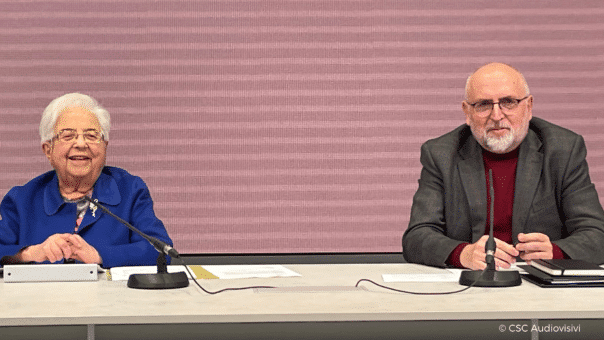
General Assembly Diary 5 – January 28, 2021 Today, at the Focolari Assembly it has been a day of assessment. The programme included group discussion on the President’s report on the past six years. The participants received the document over a week ago and so each one had time to examine it in detail. Many questions emerged; some of which were put to the President Maria Voce and to Co-President Jesús Morán in the early afternoon.

Maria Voce and Jesús Morán
Focolare Communications Office
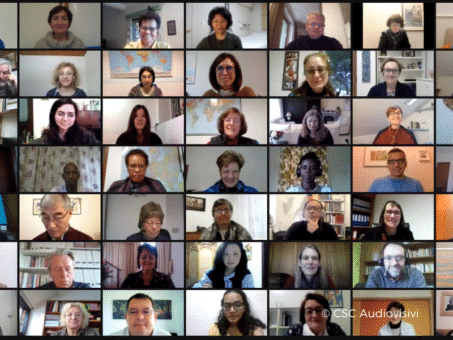
General Assembly Diary 4, 27 January 2021 At the heart of the meditations, the reflections, and the communion in this third and final day of the spiritual retreat of the General Assembly, is the icon of the Most Blessed Trinity. This was presented as the model of a “collective holiness” by Maria Voce and as relationships of love that bring out the “design of God” on every person by Claudio Guerrieri.

Christians from two Orthodox Churches
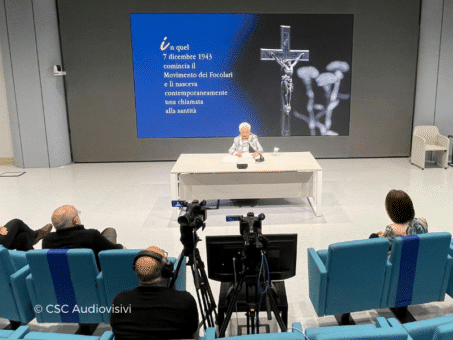
Maria Voce
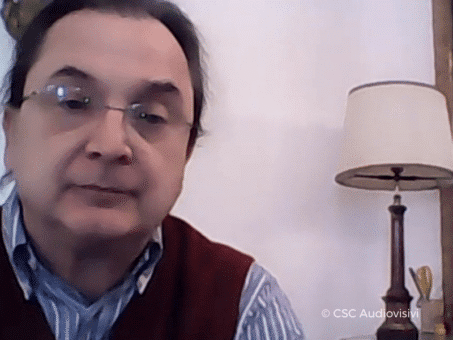
Claudio Guerrieri
 So, these three days of deep retreat have drawn to a close, at times maybe it was also a bit unsettling but full of ideas also for the decisions that have to develop. As one of the young people described in the final session of communion: “It’s been a moment for listening to one another and for trying to understand in what direction the Holy Spirit is calling the Focolare in this future period, and to whom to entrust the tasks for taking ahead this Work (of Mary) with the challenges and the opportunities that the next six years will present.”
So, these three days of deep retreat have drawn to a close, at times maybe it was also a bit unsettling but full of ideas also for the decisions that have to develop. As one of the young people described in the final session of communion: “It’s been a moment for listening to one another and for trying to understand in what direction the Holy Spirit is calling the Focolare in this future period, and to whom to entrust the tasks for taking ahead this Work (of Mary) with the challenges and the opportunities that the next six years will present.”
Focolare Communications Office
How to watch English subtitles, click here https://youtu.be/4gp92udqK0U
Living for unity means contributing to it personally, on a daily basis, starting with relationships in the family, at work, certain that this transforms situations, creates communion, fraternity and solidarity. A different logic When I returned from Sunday Mass that morning I found the kitchen in complete chaos indicating that our son and his friends had been partying all night. It would have completely justifiable and serve as a lesson to leave everything it was so that it could be “seen” and we could then talk about it. However, the Gospel reading I had just listened to did not leave me in peace. It was about forgiveness. Forgive seventy times seven. As I began to clear up the kitchen, I felt a different kind of “justice” come to mind one based on a different kind of logic. It was as if the external disorder had to find space within me first. The anger and disappointment I felt towards our son gradually started to diminish. When our son woke up he asked me why I was so happy. Not registering a response, and after a period of silence, he began to open up. He had got into drugs and was asking for help. Later on we broke the news to his father. Like a seed, the Word began to germinate and as a result, our son’s situation and the whole family’s situation changed. (M. J. – Norway) A lesson from my daughter As head of a large department in the company where I work, I have always been committed to helping employees to do their best, competently and with precision. But after a few years someone asked to be dismissed and others were complaining. What was wrong? I didn’t understand…One day my youngest daughter taught me a great lesson. I was helping her with her homework and as I was scrolling through her notebook I started pointing out all the teacher’s corrections. She started to cry saying: ‘Daddy, do you only see the mistakes? Don’t you see all the pages with top marks?” I realised I was making exactly the same mistake at work: only seeing others’ faults. It was a real light for me. I realised I needed to put on a different pair of glasses, ones that give love. It wasn’t easy. I secretly started counting the times I did manage, and each day the number increased. One day one of the staff asked me why I was so happy, and it came naturally to tell him about the lesson my daughter had taught me. (J. G. – Portugal) Alcoholic husband Because my husband was an alcoholic, there were no more parties, anniversaries or friendships. All this would have been bearable were it not for the violent outbursts. We were living on his pension (when we managed to stop him spending it) and on the cleaning work I did in the apartment building. At times it demanded great heroism to keep going like this. “Why don’t you leave him?” my relatives and even our children, who had left home because of him, used to say but he would have ended up on the street and it was this that held me back. He was the father of my children. In the days leading up to an operation he had to undergo, the absence of alcohol made him even more irritable. Nevertheless, he agreed to undergo a detoxification programme. It took a long time but he did start to make progress. It was like watching a child learn to walk. After a few years, he regained the will to live, to enjoy his family and even his first grandchild. We are nearing the end of our lives but I can say that were it not for my faith I would not have had the strength to stay with him. (M. D. – Hungary)
Edited by Stefania Tanesini
(taken from Il Vangelo del Giorno, Città Nuova, year VII, no.1, January-February 2021)
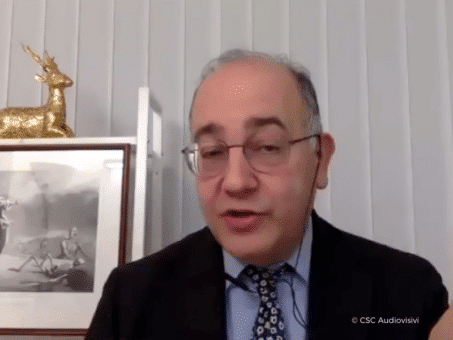
General Assembly Diary 3, 26 January 2021
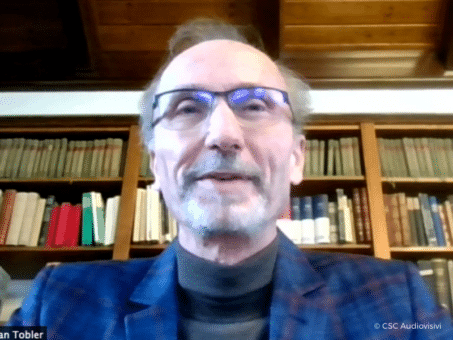
Stefan Tobler
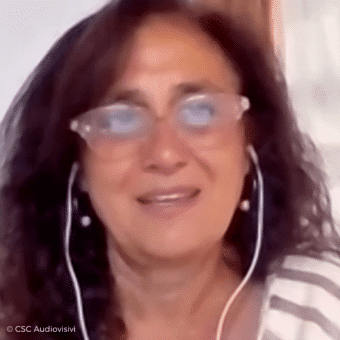
Silvina Chemen
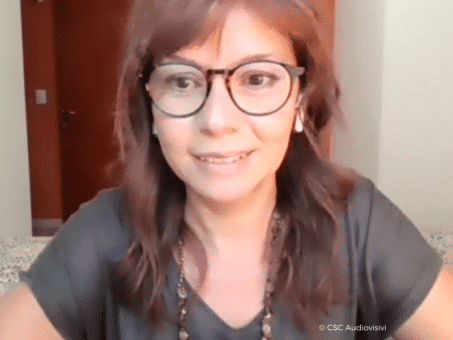
Paula Luengo

Luigino Bruni
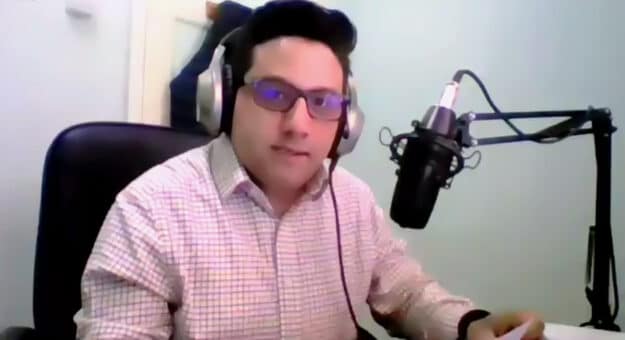
General Assembly /25 January 2021 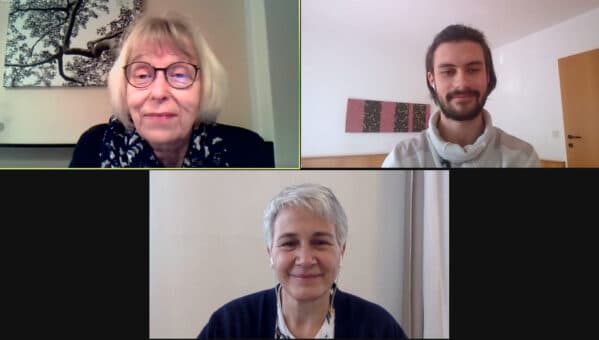 The second day of the General Assembly of the Focolare began with an ecumenical prayer presented by participants from various Churches. It was addressed to Jesus in his forsakenness on the cross, so that he would help each one to “grow in listening to one another”; teach us to “welcome together the Holy Spirit” and “the cry of today’s humanity” so as “to become instruments of unity”. Then there were further votes which had been put off from yesterday and which are necessary for adapting the regulation of the Assembly to an on-line format. So, the spiritual retreat for all the participants started a little late and it will finish on Wednesday 27th January. This is an essential moment in the Assembly, as it says in the Movement’s Statutes, “so that the voters…may be docile to the grace of the Holy Spirit.”
The second day of the General Assembly of the Focolare began with an ecumenical prayer presented by participants from various Churches. It was addressed to Jesus in his forsakenness on the cross, so that he would help each one to “grow in listening to one another”; teach us to “welcome together the Holy Spirit” and “the cry of today’s humanity” so as “to become instruments of unity”. Then there were further votes which had been put off from yesterday and which are necessary for adapting the regulation of the Assembly to an on-line format. So, the spiritual retreat for all the participants started a little late and it will finish on Wednesday 27th January. This is an essential moment in the Assembly, as it says in the Movement’s Statutes, “so that the voters…may be docile to the grace of the Holy Spirit.” 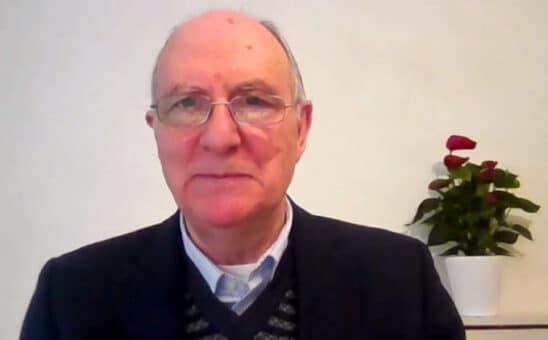 The first topic chosen, put the participants in front of what could be defined as the entrance key into the mysticism of Chiara Lubich: a solemn pact made by the foundress on 16th July 1949 with the politician and author Igino Giordani, co-founder of the Movement, in the Dolomites. In that pact – as was emphasized by Fr Fabio Ciardi, Oblate of Mary Immaculate and theologian in consecrated life – Chiara Lubich and Igino Giordani, asked Jesus who they had just received in the Eucharist to be the one to create unity between them. They asked him to use their full and mutual readiness to welcome the other, to value the thought of the other and in this way to open up a space to allow the Holy Spirit to enter.
The first topic chosen, put the participants in front of what could be defined as the entrance key into the mysticism of Chiara Lubich: a solemn pact made by the foundress on 16th July 1949 with the politician and author Igino Giordani, co-founder of the Movement, in the Dolomites. In that pact – as was emphasized by Fr Fabio Ciardi, Oblate of Mary Immaculate and theologian in consecrated life – Chiara Lubich and Igino Giordani, asked Jesus who they had just received in the Eucharist to be the one to create unity between them. They asked him to use their full and mutual readiness to welcome the other, to value the thought of the other and in this way to open up a space to allow the Holy Spirit to enter.
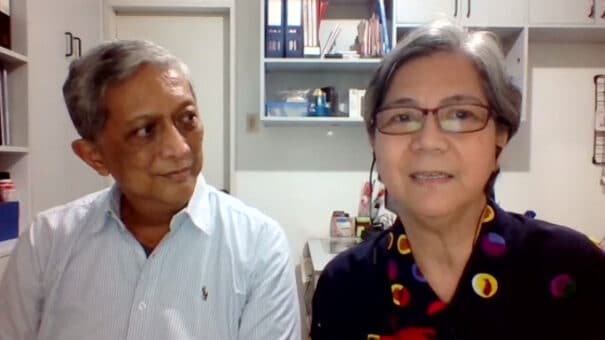
Vicky and Vic
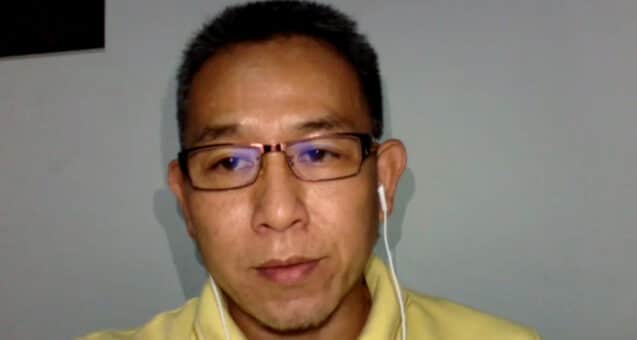
Somjit, a Buddhist from Thailand

Rassim, a Muslim from Algeria
 The second day of the General Assembly of the Focolare began with an ecumenical prayer presented by participants from various Churches. It was addressed to Jesus in his forsakenness on the cross, so that he would help each one to “grow in listening to one another”; teach us to “welcome together the Holy Spirit” and “the cry of today’s humanity” so as “to become instruments of unity”. Then there were further votes which had been put off from yesterday and which are necessary for adapting the regulation of the Assembly to an on-line format. So, the spiritual retreat for all the participants started a little late and it will finish on Wednesday 27th January. This is an essential moment in the Assembly, as it says in the Movement’s Statutes, “so that the voters…may be docile to the grace of the Holy Spirit.”
The second day of the General Assembly of the Focolare began with an ecumenical prayer presented by participants from various Churches. It was addressed to Jesus in his forsakenness on the cross, so that he would help each one to “grow in listening to one another”; teach us to “welcome together the Holy Spirit” and “the cry of today’s humanity” so as “to become instruments of unity”. Then there were further votes which had been put off from yesterday and which are necessary for adapting the regulation of the Assembly to an on-line format. So, the spiritual retreat for all the participants started a little late and it will finish on Wednesday 27th January. This is an essential moment in the Assembly, as it says in the Movement’s Statutes, “so that the voters…may be docile to the grace of the Holy Spirit.”  The first topic chosen, put the participants in front of what could be defined as the entrance key into the mysticism of Chiara Lubich: a solemn pact made by the foundress on 16th July 1949 with the politician and author Igino Giordani, co-founder of the Movement, in the Dolomites. In that pact – as was emphasized by Fr Fabio Ciardi, Oblate of Mary Immaculate and theologian in consecrated life – Chiara Lubich and Igino Giordani, asked Jesus who they had just received in the Eucharist to be the one to create unity between them. They asked him to use their full and mutual readiness to welcome the other, to value the thought of the other and in this way to open up a space to allow the Holy Spirit to enter.
The first topic chosen, put the participants in front of what could be defined as the entrance key into the mysticism of Chiara Lubich: a solemn pact made by the foundress on 16th July 1949 with the politician and author Igino Giordani, co-founder of the Movement, in the Dolomites. In that pact – as was emphasized by Fr Fabio Ciardi, Oblate of Mary Immaculate and theologian in consecrated life – Chiara Lubich and Igino Giordani, asked Jesus who they had just received in the Eucharist to be the one to create unity between them. They asked him to use their full and mutual readiness to welcome the other, to value the thought of the other and in this way to open up a space to allow the Holy Spirit to enter. 
Vicky and Vic

Somjit, a Buddhist from Thailand

Rassim, a Muslim from Algeria
 The second day of the General Assembly of the Focolare began with an ecumenical prayer presented by participants from various Churches. It was addressed to Jesus in his forsakenness on the cross, so that he would help each one to “grow in listening to one another”; teach us to “welcome together the Holy Spirit” and “the cry of today’s humanity” so as “to become instruments of unity”. Then there were further votes which had been put off from yesterday and which are necessary for adapting the regulation of the Assembly to an on-line format. So, the spiritual retreat for all the participants started a little late and it will finish on Wednesday 27th January. This is an essential moment in the Assembly, as it says in the Movement’s Statutes, “so that the voters…may be docile to the grace of the Holy Spirit.”
The second day of the General Assembly of the Focolare began with an ecumenical prayer presented by participants from various Churches. It was addressed to Jesus in his forsakenness on the cross, so that he would help each one to “grow in listening to one another”; teach us to “welcome together the Holy Spirit” and “the cry of today’s humanity” so as “to become instruments of unity”. Then there were further votes which had been put off from yesterday and which are necessary for adapting the regulation of the Assembly to an on-line format. So, the spiritual retreat for all the participants started a little late and it will finish on Wednesday 27th January. This is an essential moment in the Assembly, as it says in the Movement’s Statutes, “so that the voters…may be docile to the grace of the Holy Spirit.”  The first topic chosen, put the participants in front of what could be defined as the entrance key into the mysticism of Chiara Lubich: a solemn pact made by the foundress on 16th July 1949 with the politician and author Igino Giordani, co-founder of the Movement, in the Dolomites. In that pact – as was emphasized by Fr Fabio Ciardi, Oblate of Mary Immaculate and theologian in consecrated life – Chiara Lubich and Igino Giordani, asked Jesus who they had just received in the Eucharist to be the one to create unity between them. They asked him to use their full and mutual readiness to welcome the other, to value the thought of the other and in this way to open up a space to allow the Holy Spirit to enter.
The first topic chosen, put the participants in front of what could be defined as the entrance key into the mysticism of Chiara Lubich: a solemn pact made by the foundress on 16th July 1949 with the politician and author Igino Giordani, co-founder of the Movement, in the Dolomites. In that pact – as was emphasized by Fr Fabio Ciardi, Oblate of Mary Immaculate and theologian in consecrated life – Chiara Lubich and Igino Giordani, asked Jesus who they had just received in the Eucharist to be the one to create unity between them. They asked him to use their full and mutual readiness to welcome the other, to value the thought of the other and in this way to open up a space to allow the Holy Spirit to enter. 
Vicky and Vic

Somjit, a Buddhist from Thailand

Rassim, a Muslim from Algeria
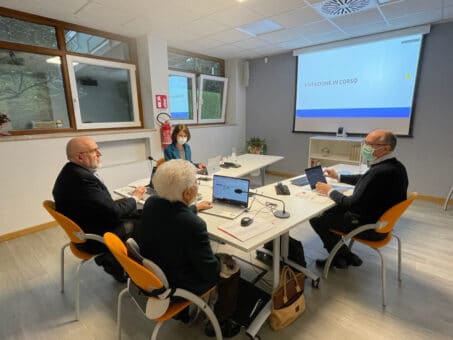
General Assembly: Diary 1 – January 24, 2021 It has begun! The Focolare Movement General Assembly started at 12.30 (UTC +1). It has been long awaited for, and Focolare members and adherents from all over the world have participated in its preparation. It was scheduled to start at the beginning of September 2020, but had to be postponed because of the pandemic . It is now being held electronically. 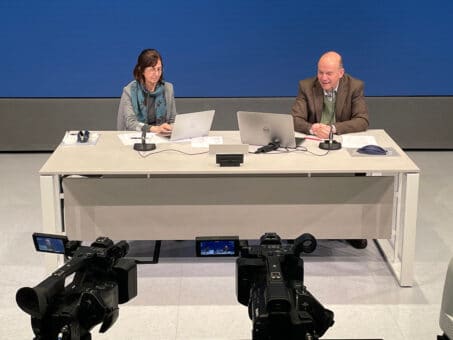 The choice of this date is very significant. Two days ago, on January 22, when it was Chiara Lubich’s birthday, the Movement marked the end of the birth centenary year of its founder.Today, January 24, it recalls the day when in 1944, Chiara ‘discovered’ the reality of Jesus Forsaken who became the ‘spouse of her soul’ and moved her to ‘seek him’ in all the suffering and pain of humanity and to rebuild relationships and bridges of unity. According to what is defined by its rules, the Assembly is “the first and most important governing body of the Focolare Movement”. 360 members are taking part in it; 139 are there by right, 181 have been elected and 40 have been invited by the President. Although these participants are in different places all over the world, they all entered the one big virtual hall, aware of the solemnity and importance of this moment. They are all contributing to build the worldwide lively family atmosphere , which is also present on the virtual platform.
The choice of this date is very significant. Two days ago, on January 22, when it was Chiara Lubich’s birthday, the Movement marked the end of the birth centenary year of its founder.Today, January 24, it recalls the day when in 1944, Chiara ‘discovered’ the reality of Jesus Forsaken who became the ‘spouse of her soul’ and moved her to ‘seek him’ in all the suffering and pain of humanity and to rebuild relationships and bridges of unity. According to what is defined by its rules, the Assembly is “the first and most important governing body of the Focolare Movement”. 360 members are taking part in it; 139 are there by right, 181 have been elected and 40 have been invited by the President. Although these participants are in different places all over the world, they all entered the one big virtual hall, aware of the solemnity and importance of this moment. They are all contributing to build the worldwide lively family atmosphere , which is also present on the virtual platform. 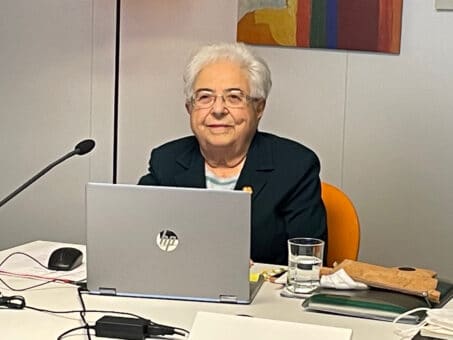 Maria Voce, the outgoing president, who is at the end of her second term, opened the Assembly with a solemn appeal. She invited the participants to put themselves in the attitude of Jesus at the Last Supper and wash one another’s feet. She said that this means being ready “to listen to one another, to understand one another, to go beyond differences, to become truly brothers, which means truly equal, truly with the highest dignity, which is the dignity that Jesus gives us because he makes us all children of God and brothers and sisters”.
Maria Voce, the outgoing president, who is at the end of her second term, opened the Assembly with a solemn appeal. She invited the participants to put themselves in the attitude of Jesus at the Last Supper and wash one another’s feet. She said that this means being ready “to listen to one another, to understand one another, to go beyond differences, to become truly brothers, which means truly equal, truly with the highest dignity, which is the dignity that Jesus gives us because he makes us all children of God and brothers and sisters”.  Rules being followed, today’s meeting included several voting sessions. In the first election, the two moderators who will coordinate and lead the work were chosen. They are Uschi Schmitt, a German doctor and Andrea Ponta, an Italian engineer. Then there was the approval of the electoral commission ; its members are Danilo Virdis, Flavia Cerino, Waldery Hilgeman, Laura Bozzi and Sister Tiziana Merletti, all residing in Italy. For legal reasons they are all present at the official seat of the Assembly, the International Focolare Centre in Rocca di Papa (Italy). In subsequent voting sessions, the Assembly approved the programme for these days and an amendment to the Movement’s General Statutes reducing the minimum number of councillors to be elected from 30 to 20. The three days of spiritual retreat for participants will begin tomorrow.
Rules being followed, today’s meeting included several voting sessions. In the first election, the two moderators who will coordinate and lead the work were chosen. They are Uschi Schmitt, a German doctor and Andrea Ponta, an Italian engineer. Then there was the approval of the electoral commission ; its members are Danilo Virdis, Flavia Cerino, Waldery Hilgeman, Laura Bozzi and Sister Tiziana Merletti, all residing in Italy. For legal reasons they are all present at the official seat of the Assembly, the International Focolare Centre in Rocca di Papa (Italy). In subsequent voting sessions, the Assembly approved the programme for these days and an amendment to the Movement’s General Statutes reducing the minimum number of councillors to be elected from 30 to 20. The three days of spiritual retreat for participants will begin tomorrow.
Focolare Communication Office
22 January 2020 -22 January 2021: the Centenary year of Chiara Lubich’s birth ends today. 365 days, marked by the pandemic, quite different from what has been planned, but they were ones that opened new paths and new perspectives. ‘Celebrate to meet’ was the motto chosen for the Centenary of the birth of Chiara Lubich (1920-2020), the founder of the Focolare Movement. A year ago, there were many initiatives planned in different parts of the world to celebrate this event, little thinking that a pandemic would crop up and leave its mark on it, but indeed it did not stop it. In some cases, it has even enhanced the possibilities of ‘meeting’ Chiara. Let us go back to the beginning. The Centenary celebrations started on December 7, 2019 when the exhibition “Chiara Lubich World-City” was inaugurated at the Galleries in Trent, Lubich’s hometown. This inauguration was held under the patronage of the President of the Italian Republic, and it was promoted by the Historic Museum Foundation of the Trent region in collaboration with the Chiara Lubich Centre. Maria Voce, the President of the Focolare Movement was awarded the “Seal of St. Wenceslas” by the Autonomous Province of Trent on that same day. On the following day, a separate section of the exhibition, dedicated to the years 1949-1959, was inaugurated in Tonadico, in the municipality of Primiero San Martino di Castrozza (Italy). In the following weeks, similar exhibitions, enriched with the local touch, were launched in other countries. The exhibition in Nairobi (Kenya) highlights the Movement’s development in Africa, while a section of the one in Jerusalem is dedicated to Lubich’s relationship with this city and her dream that is now becoming a reality: a centre of spirituality, study, dialogue and formation for unity. Chiara Lubich was born on January 22. In 2020, precisely on this date, Rome celebrated her birth centenary through an evening dedicated to her, while it was twenty years before when the Italian capital conferred on her its honorary citizenship. Francesco Rutelli, the former mayor of Rome said: “On that 22nd January 2000, Chiara pronounced her committment to work more and better for Rome, by promoting concrete mutual love everywhere. What could be more beautiful than making her words our own, today?” A few days later, Sergio Mattarella, the President of the Republic addressed the gathering during the Centenary event that was held at the “Chiara Lubich” Mariapolis Centre in Cadine (TN). Besides Maria Voce, the president of the Movement, Jesús Morán, the co-president and the local authorities, there were more than 900 people present. Another 20,000 watched the live streaming transmission. In his speech Mattarella highlighted fraternity, applied to civil and political activity, as the distinctive feature of Chiara Lubich’s spirituality. Trent also provided the setting for the first part of the international conference: “A Charism at the service of the Church and humanity“. 7 Cardinals and 137 Bishops, friends of the Focolare Movement from 50 countries, participated in this conference, the second part of which was held in the international Focolare small town of Loppiano (Incisa Figline in Valdarno – Italy). In his message, Pope Francis warmly welcomed this conference, expressing “gratitude to God for the gift of the charism of unity through the witness and teaching (…) of Chiara Lubich”. During the same days, another event linked to the Centenary took place at the Mariapolis Centre in Castel Gandolfo. More than 400 religious men and women, consecrated and lay Catholics – including a group from the Orthodox Church – from 100 religious families in 33 countries were the protagonists at the event: “Charisms in Communion: Chiara Lubich’s Prophecy“, a workshop for dialogue among different charisms promoting communion between religious families through the spirituality of unity. Then the pandemic began to spread in countries all over the world. And this meant change even for the Centenary: some events had to be cancelled, others were moved to the web. The Trent exhibition has been enriched with a virtual itinerary. Thanks to an intergenerational team, the one planned in Brazil has been transformed, and an itinerary dedicated to Chiara Lubich is now being launched on social media through social profiles @focolaresbrasil (Facebook, Instagram and Youtube). Web-based initiatives have allowed many more people to visit the exhibitions dedicated to Lubich than the ones where one would have actually been able to go to a place to see. But there were other events that could still take place: such as the issue of two postage stamps dedicated to Chiara Lubich in the Czech Republic and the Competition for Italian schools on the theme: “One city is not enough”. A number of schools participated in this competition that was promoted by the Chiara Lubich/New Humanity Centre and by the Foundation of the Historical Museum of Trentino, in collaboration with the Ministry of Education, University and Research. The prize-giving ceremony will be held on February 16, 2021. The lockdown forced the International Focolare Centre in Rocca di Papa (Italy) to close its doors during certain periods in 2020. But since a few months, visits have been made possible in compliance with current health regulations. One of the most important visits was that of His Holiness the Patriarch of Constantinople Bartholomew I, who came to pray at the tomb of Chiara Lubich. There were also various new publications linked to the Centenary and events to present and promote them, both in presence and via web, namely: the twenty-ninth edition of the book “Meditations” by Chiara Lubich; two texts from the series “Works of Chiara Lubich” published by Città Nuova: “Conversations through link-ups” edited by Michel Vandeleene and “Talks in the civil and ecclesial sphere” edited by Vera Araújo; and the new biography about Chiara Lubich, the way of unity, between history and prophecy, written by Maurizio Gentilini. The English edition of the biography by Gentilini was also presented at the Italian Consulate in Mumbai, India, during a web event dedicated to Chiara Lubich’s centenary. Stefania Constanza, the Italian Consul in Mumbai, Vinu Aram, director of the Shanti Ashram in Coimbatore and Maurizio Gentilini took part in this web event. A “mixed” approach was chosen – partly in “presence” at Trent and partly online – for the study meeting about “Chiara Lubich in dialogue with the world. A linguistic, philological and literary approach to her writings”. This was organised by the Chiara Lubich Centre and the Study and Research Group on Linguistics, Philology and Literature of the Abbà School (Interdisciplinary Study Centre of the Focolare Movement) together with experts from various countries. Some of the papers are available in the section “Conference Documents” on the Chiara Lubich Centre website. On January 3, 2021, almost when the centenary year was coming to its end, Rai Uno, the main Italian television network presented the TV-movie “Chiara Lubich. Love conquers all”. The director of this movie was Giacomo Campiotti, while Cristiana Capotondi played the role of Chiara Lubich. 5 million 641 thousand viewers watched the film that was made by Rai Fiction and Eliseo Multimedia. Then, many others in other countries of the world were able to see it thanks to RaiPlay and Rai Italia. And today, January 22, 2021, the Centenary comes to its end. But does it really end? Recently, when Maria Voce, the president of the Focolare Movement spoke about this, she said that ‘the living encounter with Chiara cannot be limited to 100 years, to a centenary year. It is not over; it will continue as long as there are people from Chiara’s family on earth who will continue to witness that Chiara is alive, that Chiara’s charism still has something to say to the world”.
Anna Lisa Innocenti